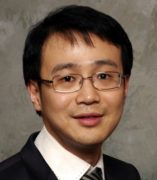
Seung Chung, DVM, PhD
Associate Professor (tenured)
Oral Biology
Contact
Address:
College of Dentistry 801 S. Paulina Street, IL 60612
Email:
Selected Publications
Irfan M, Kim JH, Marzban H, Reed DA, George A, Cooper LF, Chung S (2022) The role of complement C5a receptor in DPSC odontoblastic differentiation and in vivo reparative dentin formation. International Journal of Oral Science 14:7.
Irfan M, Kim JH, Druzinsky R, Ravindran S, Chung S (2022) Complement C5aR/LPS-induced BDNF and NGF modulation in human dental pulp stem cells. Scientific Report 12:2042.
Pasiewicz R, Valverde Y, Narayanan R, Kim JH, Irfan M, Lee NS, George A, Cooper LF, Alapati S, Chung S (2021) C5a complement receptor modulates odontogenic dental pulp stem cell differentiation under hypoxia. Connective Tissue Research 1-10.
Chung S, Biswas S, Sohn J, Jiang P, Dehghan S, Marzban H, Deng W (2018) P38alpha MAPK deletion in oligodendrocyte does not attenuate myelination defects in the mouse model of periventricular leukomalacia. Neuroscience 386:175-181.
Valverde Y, Narayanan R, Alapati SB, Chmilewsky F, Huang CC, Ravindran S, Chung S (2018) PARP-1 inhibition enhances bran-derived neurotrophic factor secretion in dental pulp stem cells-derived odontoblast-like cells. Journal of Endodontics 44:1121-1125.
Chmilewsky F, About I, Cooper LF, Chung S (2018) C5L2 silencing in human fibroblasts enhances nerve outgrowth under LTA stimulation. Journal of Endodontics 44:1396-1401.
Chmilewsky F, About I, Chung S (2017) C5L2 receptor represses BDNF secretion in LTA-stimulated pulp fibroblasts. Journal of Dental Research 44:1396-1401.
Chmilewsky F, Ayaz W, Appiah J, About I, Chung S (2016) Nerve growth factor secretion in pulp fibroblasts is modulated by complement c5a receptor and implied in neurite outgrowth. Scientific Report 6:31799.
Chmilewsky F, About I, Chung S (2016) Pulp fibroblasts control nerve regeneration through complement activation. Journal of Dental Research 95:913-922.
Chung S, Biswas S, Selvaraj V, Liu XB, Sohn J, Jiang P, Chen C, Chmilewsky F, Marzban H, Horiuchi M, Pleasure D, Deng W (2015) The p38alpha mitogen-activated protein kinase is a key regulator of myelination and remyelination in the CNS. Cell Death and Disease 6,e1748.
Education
- University of California Davis School of Medicine, Postdoctoral Fellow, 2009-2013
- University of Calgary Cumming School of Medicine, Canada, PhD (Neuroscience), 2008
- Chungnam National University College of Veterinary Medicine, South Korea, MS (Histology), 2003
- Chungnam National University College of Veterinary Medicine, South Korea, DVM (Veterinary Medicine), 2001
Research Currently in Progress
Role of Complement Receptors and p38a/CEBP in Reparative Dentinogenesis
Dental caries represents a common public health problem. The complement system, a key player of innate immunity and inflammation, is expressed and activated in the carious teeth. Very little information is available about the involvement of the complement in the tooth’s response to the common infection, caries. Moreover, inflammatory complement C5a’s role in caries-mediated dentin regeneration has received little recognition. The aim of this study is to determine the role of the complement C5a receptor-C5L2 in regulating dental pulp stem cells (DPSC) dentinogenic differentiation and in tooth dentin regeneration under an inflammatory context. We provide further evidence that p38 map kinase (p38a) plays a key role in DPSC-mediated dentinogenesis. Here, we explore ways of enhancing this odontoblastic function of DPSCs via a novel C5L2 pathway involving p38a/CEBP signaling. We will define the role of C5L2 in the odontoblastic differentiation of DPSC and characterize the mechanism of action of C5L2 during dentinogenesis. In vivo dentin formation will be evaluated using the mouse pulp-capping/caries model combined with the C5aR, C5L2, CEBP and DSPP/p38 knockout mice. These studies will provide the basis for future potential therapeutic interventions of dentin-pulp complex regeneration and vital tooth preservation.
Microenvironmentally Engineered Dental Pulp Stem Cells in Inferior Alveolar Nerve Regeneration
Inferior alveolar nerve (IAN) regeneration is essential for proper nerve sensation as well as maintaining tooth integrity and function. A promising attempt to regenerate peripheral nerves involves cell-based therapy that can differentiate to neurons and/or secrete trophic factors to promote nerve regeneration. These processes are known to be mediated by regeneration trophic factors secreted by transplanted cells. Regenerative medicine has focused on the dental pulp stem cell (DPSC) as a ready source of multipotential adult stem cells. DPSCs are potentially well-suited to nerve regeneration given their less invasive accessibility, neural crest origin, and better regenerative qualities. The proposed project adopts an innovative and alternative approach to IAN regenerative sciences by leveraging the neurotrophic features of microenvironmentally engineered DPSCs. Our preliminary data demonstrate that adjusting the microenvironments during DPSC differentiation by hypoxia, cell-to-cell contact and modification of the receptor/intracellular signaling significantly enhanced the neurotrophic capacity of the differentiated cells. The goal of this project is to define an optimal microenvironment for the neurogenic DPSC differentiation to support IAN regeneration and validate the capacity of these cells. For more details, visit our lab website https://chungsh.people.uic.edu.